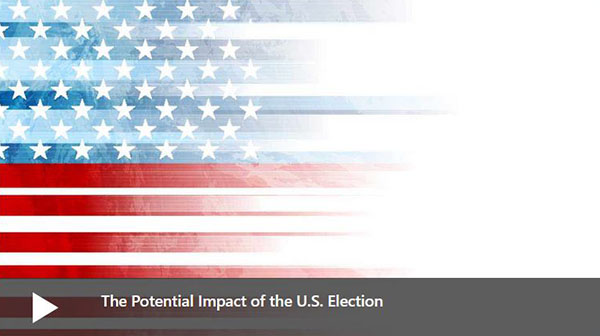Cailin Birch, global economist at The Economist Intelligence Unit, and Tom Richards, investment director at Canaccord Genuity, on the US election and its impact on the financial services sector
by Bethan Rees
The next US election will be held on 3 November 2020. This year's candidates are the Republican president, Donald Trump, and Democratic candidate Joe Biden.
Trump and Biden are competing to win Electoral College votes, with each state allocated a certain number of these votes based on its population. There are 538 Electoral College votes in total, with a majority of 270 or more required to win the election.
Announcing the president following the election can take several days or even weeks. However, it tends to be relatively clear who the winner will be in the early hours of the following morning.
Cailin Birch, global economist at The Economist Intelligence Unit, and Tom Richards, Chartered FCSI, investment director at Canaccord Genuity Wealth Management, share some insight on the US election framework and its impact on financial markets.
What do federal elections elect? And what do electors vote on?
Cailin: The president, vice president and members of Congress are chosen in federal elections. For the presidential election, the vote is tallied at the state level. In most states, the candidate who wins the plurality of the vote in each state wins all of that state's votes in the Electoral College. State legislatures send a slate of electors to the Electoral College to cast votes on behalf of that state's winning candidate. There are two exceptions, Maine and Nebraska, where the Electoral College votes are distributed proportionally based on the outcome of the popular vote.
What does it mean to win the popular vote and lose the Electoral College?
Cailin: The popular vote reflects the nationwide tally of votes for each candidate, irrespective of state boundaries. However, the winner of the presidential election is decided not by the outcome of the popular vote, but by a majority of, or at least 270, Electoral College votes. If a candidate wins the state-level election by a narrow margin, all of that state's electoral votes go to that candidate (again, with the exception of Maine and Nebraska). This means that if a candidate wins narrow victories in a few key states, they can still get to 270 votes in the Electoral College – and win the election – even though they lost the popular vote. This is how Donald Trump won the presidency in 2016, with a very narrow margin of victory in Michigan, Wisconsin, Pennsylvania and Florida.
According to an article by The Telegraph, roughly 80 million people will vote via mail. What are the issues with this?
Cailin: There are several. The first is that the US Postal Service will see a much higher than usual influx of ballots around election day. There is a risk, particularly given longstanding budget shortfalls and recently proposed budget cuts at the US Postal Service, that there will be delays in delivering ballots. Many states have extended the timeline to receive and count ballots, but there is still a risk that some ballots will be excluded owing to delays.
"If the election dispute drags on into December, financial markets are likely to be shaken"
Second, mail-in ballots tend to be more vulnerable to irregularities, which could mean that a large number of ballots are excluded. These irregularities could include improper postage (for example, if an envelope is not postmarked) or if a voter has forgotten to sign the ballot, signed it in the wrong place, or if the signature does not match the signature on voter registration rolls. To be sure, irregularities can still occur in voting stations – the 'hanging chad' incident in the 2000 election is the most prominent example (see boxout for more on this) – but they are less likely to happen compared with postal ballots.
The reason that the two issues above are so controversial in 2020 is that more Democrats have indicated that they plan to vote by post than Republicans, owing to health concerns. A poll by Pew Research Center finds that 51% of Biden supporters say that they plan to vote by mail (or absentee), compared with 25% of Trump supporters. If a higher number of Biden votes are excluded due to polling errors or delivery delays, this could skew the outcome of the election.
Finally, Trump has already suggested, without any evidence, that he considers the postal ballot system to be fraudulent. If Biden wins the election by a narrow margin, and postal ballots are key to his election, Trump is likely to use this as grounds to contest the outcome in the courts.
The 'hanging chad' incident
In the US election in 2000, where the voters were electing either Al Gore or George W Bush to be the next president, there was some controversy over vote counting. In Florida, there was an election recount that occurred in the weeks following election day due to the very small margin of votes for George W Bush. The recount, that was done by hand, ran into some issues when some holes were not completely punched out of their ballot, therefore hanging by two or three corners. This is called a ‘hanging chad’ ballot.
If the result isn't established for weeks, what would the impact of this be on financial markets?
Cailin: If the election dispute drags on into December, financial markets are likely to be shaken. Investors will be looking for promises of a stable transition of power and clarity on what US policy is going to look like in 2021. The Covid-19 crisis will amplify this, as an ongoing dispute over the election outcome could hinder crucial legislative progress, for example, on a second round of relief spending, from November to January.
How will the US election impact CISI members? What elements of the election should they be on the lookout for?
Cailin: Trump and Biden's policy platforms could not be more contrasting. A victory for Trump would suggest that taxes will remain low and that the administration will keep a tight focus on pro-business policies, including stripping back regulation. However, we would also expect to see a slower and more economically disruptive recovery from the Covid-19 crisis under the Trump administration, in line with its track record thus far in 2020 and the Republican Party's hesitance to keep the public spending taps open.
A victory for Biden would probably imply an upward revision in US tax rates, albeit to a more modest degree than some progressive elements of the Democratic base would like to see. We expect clearer government messaging and a coordinated Covid-19 strategy under a Biden administration to be beneficial for the economy, stock markets and the dollar.
A Business Insider article reports that JP Morgan says "stocks will climb no matter who wins the presidential election and could surge 19% in one scenario". Would you say this is true? And if so, why is this the case?
Cailin: To a certain extent, yes. The stock market is likely to be bolstered slightly as the current political uncertainty fades in 2021. The VIX volatility index is currently pricing in a much more volatile trading period around the 2020 election than previous elections. No matter who wins, a clearer outlook for the 2021–2024 policy environment will be helpful to markets. That said, we would expect to see stronger market gains following a Biden victory than a Trump victory.
According to a Forbes article, "historically, US stocks and bonds tend to perform better during an election year compared to the year after". Are there any 'rules of thumb' that can be applied to US elections?
Cailin: There is a good chance that market trends in 2020 could divert from the norm, given the high level of uncertainty injected by the ongoing coronavirus pandemic and the likelihood that the result of the presidential election could be disputed.
Biden's tax policy includes raising taxes for Americans making more than US$400,000, raising corporate tax rates from 21% to 28% and imposing sanctions on tax havens. How does this impact portfolio planning for those in the US? And how will this impact markets globally?
Cailin: Biden's plans to lift taxes could dampen market enthusiasm in early 2021. However, any downward pressure here could be partially offset by two factors:
- First, that Biden has outlined a more ambitious federal strategy for containing the coronavirus epidemic.
- Second, that a Democratic administration will be more willing to boost public spending in order to offset the impact of the pandemic. Both strategies will support an improved economic outlook, which we expect to be well received by markets.
About the experts
 Cailin Birch, global economist at The Economist Intelligence Unit, is a frequent guest in national and international media, providing critical insight into global political and economic trends.
Cailin Birch, global economist at The Economist Intelligence Unit, is a frequent guest in national and international media, providing critical insight into global political and economic trends.
She is an experienced speaker and moderator at high-level events, and can deliver thoughtful insights and draw impactful conclusions from complex discussions.

Tom Richards, Chartered FCSI is an investment director in Canaccord Genuity Wealth Management’s (CGWM) Isle of Man office. He looks after investment mandates for a number of Isle of Man-based and international clients, and their advisors, investing into multi-asset portfolios of collective funds and/or direct stocks. He is a member of CGWM’s Portfolio Construction Committee.
According to a Market Place article, Trump wants to reduce the capital gains rate from 23.8% to 15%. He also promised a 'Tax Cuts 2.0 plan' earlier this year, but no details have been laid out to voters yet. Has the lack of information on tax policies impacted global markets? And if it stays as such until after the election, will this have an impact?
Cailin: Trump's tax plans remain vague, but for the moment, this does not appear to be having a big impact on markets. Trump has been clear that his policy slant is one of low taxes and low regulation, so investors can take some clues there. For now, other factors are dominating the outlook for markets, most notably the economic impact of the virus and the government's ability, or not, to pass a second round of much-needed stimulus.
How will the trade conflict in China impact the election result?
Cailin: The ongoing Covid-19 crisis is likely to have the greatest impact on the result. However, the growing US-China rivalry has certainly shaped the race; both candidates have laid out a clear intention to counter China in their second term, in response to a growing consensus in the US that China is a competitor, not a partner. The US-China rivalry is actually one of the areas where a Trump or Biden administration would be most similar; the dispute is shifting away from trade toward more strategic areas, including technology and finance. This is likely to continue regardless of who wins the presidency.
What are the legal consequences of a disputed outcome?
Tom: They are messy. This is a surprisingly frequent occurrence and has happened regularly between 1876 and 2000. Moreover, it is particularly likely this time, given the combative nature of the candidates and likely prevalence of postal voting and accusations of voter fraud. The process to work through looks something like this:
Either presidential campaign has a certain period to challenge the result in a state. Recounts are permitted in 43 states and the District of Columbia (although some of these states require the margin between candidates’ votes to be below a certain level) and these can take lengthy periods of time in the large ‘swing states’.
"A Biden victory would not necessarily be bad for equity markets"
If a losing candidate can convince the state legislature that the popular vote count was flawed, electors can be directly appointed by the state under Article II of the Constitution. In some states, it is not compulsory for the appointed elector to vote for whoever won the popular vote and this could give competing results from the same state.
This ends up as a constitutional crisis, which in 1876 was decided two days before Inauguration Day by a special commission of 15 individuals equally drawn from the House, the Senate and the Supreme Court; and in 2000 at the Supreme Court.
What would the impact on financial markets be in the case of a Trump win, a Biden win or a disputed outcome?
Tom: A Biden victory would not necessarily be bad for equity markets, which would focus on the ‘spend’ part of ‘tax and spend’. A Biden portfolio might include renewable energy, infrastructure, companies benefiting from lower tariffs and companies levered up to more income security spending and aid from state governments. Conversely, a Trump portfolio might include defence, financials, energy and companies benefitting from tax reductions.
Companies doing large amounts of business in China may suffer from future tariffs if Trump wins; whereas Biden has promised to break up the huge tech companies.
A disputed outcome, with protestors in the streets, would lead to significant volatility across financial assets, with treasuries and gold performing as ‘safe havens’ while the outcome is decided. While in most regards this would not be a desirable outcome, it would likely open up some interesting entry points into the above longer-term investment themes.

Seen a blog, news story or discussion online that you think might interest CISI members? Email bethan.rees@wardour.co.uk.